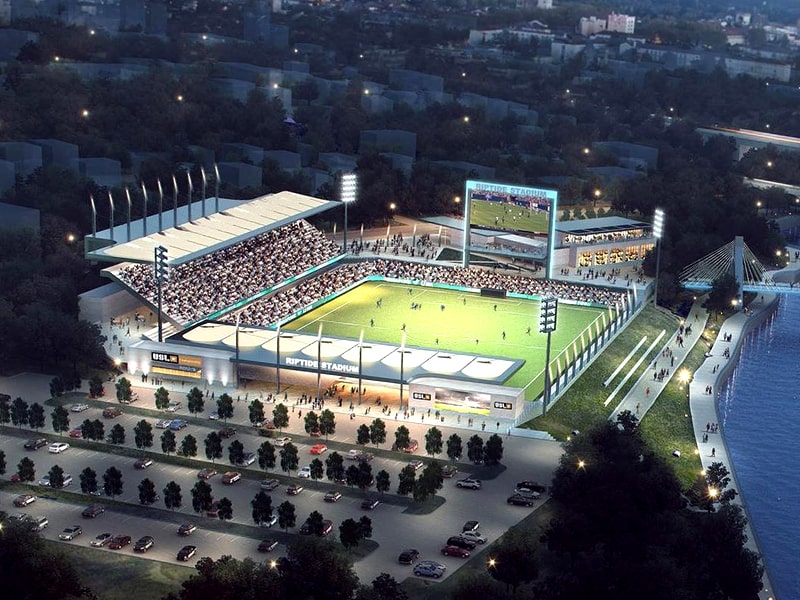A new soccer-specific facility to be built at Pawtucket, Rhode Island in US, is being viewed as one of the largest economic development project in the history of the city.
The stadium will come up for a club that will compete in the United Soccer League (USL) Championship. Fortuitous Partners founder Brett Johnson, a Brown University graduate and owner of a minor-league soccer franchise in Arizona, wants to launch a Rhode Island franchise in the USL Championship, the second tier of professional soccer in North America.
What drew Johnson to Pawtucket was, “As I looked at the landscape, [Rhode Island] is literally the number one market in the country without professional soccer, so it was no-brainer. We are kicking the soccer ball in 2022.”
The team would play in a $45-million, 7,500-seat soccer stadium which Fortuitous – which excels in real estate and public and private company operations – plans to erect on a former manufactured gas plant site, known as Tidewater, on the west bank of the Seekonk River.
The Tidewater Landing Project – the price tag of which is $400 million – was made public by Rhodes Island Governor Gina Raimondo, Pawtucket Mayor Donald Grebien and USL Chief Operating Officer Justin Papadakis recently.
The building of the arena is expected to bring about a sea change in Pawtucket’s waterfront and facilitate marked development – expanded waterfront access through a river walk park connecting downtown to the currently underutilized riverfront, a new pedestrian bridge, and other major infrastructure upgrades.
“The Tidewater Landing project is a game changer for the State of Rhode Island, the City of Pawtucket and its passionate soccer community,” said Papadakis.
“We are thrilled to bring professional soccer to this great State and city. A USL Championship club to call its own in a world-class stadium will be a tremendous community asset and will unite all Rhode Islanders around a common cause,” Papadakis further remarked.
The high spot of the Tidewater Landing project will be the stadium, and the new club is likely to be ready for use in the 2022 Championship season. The club’s rights have been acquired by Johnson, who currently serves as Co-Chair for the Championship’s Phoenix Rising FC and is the leader of Fortuitous Partners, an investment firm specializing in sports-anchored
mixed-use real estate projects.
It is estimated that the full project will help generate more than 2,500 direct and indirect jobs and more than 1,500 direct, ongoing jobs once completed.
Maintains Pawtucket Mayor Donald R Grebien, “This is an opportunity of a lifetime for the city of Pawtucket, the Blackstone Valley, and the State of Rhode Island. This $400 million-plus opportunity will create jobs and will be a transformative economic development at the gateway into our State.”
It is being observed that a professional soccer franchise playing in a new riverfront stadium is the linchpin for the whole redevelopment of downtown Pawtucket. City and State leaders say this development will be leagues ahead of the Pawtucket Red Sox Stadium proposal that collapsed more than a year back.
The stadium will be the first piece of a bigger, mixed-use project plan and would cash in on federal “Opportunity Zone” tax breaks. Fortuitous envisages building 200 apartments above 100,000 square feet of shops and restaurants which will be connected by a proposed foot bridge.
As per city and State officials, a 200-room hotel with an “indoor sports event center” and 200,000 square feet of office space is also in Fortuitous’s scheme of things.
The plan is also dependent on public support in the form of $70 million to $90 million approximately – most of it from the State through a “tax increment financing” plan which would facilitate the developer to use a portion of new tax revenue generated around the development to pay for construction.
Since the Pawsox stadium plan hit a speed breaker, Pawtucket Mayor
Donald Grebien and State Commerce Secretary Stefan Pryor began working on a plan to help the city fill the void.
“Absolutely the city is in better position today, with more revenue over 30 years than what was projected in PawSox deal,” Grebien asserted.
To build on the property, Fortuitous will first have to acquire it from its current owner, something the city has been working on for more than a year.
Pryor said “positive” conversations have been taking place over the property, but if a deal cannot be struck, the city will take it by eminent domain. The Tidewater site also has to be acquired from the National Grid.
Fortuitous’ aim is to finance the stadium privately. It is expected that public investment for this project will be primarily focused on infrastructure and other non-stadium components of the development plan.
The 120-day due diligence period will determine the total amount of the public investment (which will come from both State and City revenues). Based upon preliminary economic impact estimates over a 30-year financing period, the project is expected to pay for itself. In fact, preliminary estimates points out that taxes received by the State and City over that period have the potential to be double that of the public investment.
Continue to follow Coliseum for latest updates on venues business news. Coliseum is dedicated towards building the best global community of sports and entertainment venue executives and professionals creating better and more profitable venues.
